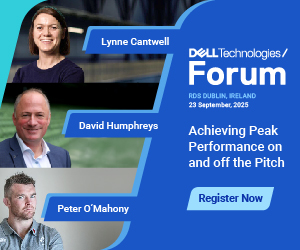You’ve got to feel sorry for Scott McNealy. The CEO of Sun Microsystems was on the last leg of a gruelling whistle-stop tour of several countries, he had popped into Ireland for a mere four hours to mark the 10th anniversary of Sun’s software development presence in Dublin, he was suffering from a cold, was stuck in a Special Olympics-induced traffic jam on the way to the airport and all the only journalist to whom he had granted an interview wanted to talk about was piston rings.
Or so it appeared to McNealy. Questions about the nitty gritty of Sun’s technology such as the viability of Sun’s Solaris on SPARC architecture when confronted with Linux on commodity-priced Intel hardware were dismissed as being of a level of minutiae that was of no concern to IT buyers.
‘Talking about microprocessors is like talking about piston rings,’ he scoffed. ‘Our customers don’t buy our systems because of the processors or operating systems that are inside them. They buy them because they want a system that solves a problem. Do you know what microprocessor you have in your phone? Do you care?’
It’s a fair point, but the fact is that Sun’s systems tend to be very much more expensive than their rivals because Sun bears the cost of designing the core processor architecture without benefiting from the same economies of scale as Intel, whose chips are increasingly to be found in servers from Sun’s traditional rivals in the Unix market as well as those running Windows operating systems.
What troubles?
Intel servers are also the platform of choice for Linux and Open Source applications. Could this in any way explain the financial troubles Sun has been experiencing over the past two years?
McNealy is unconvinced and blames the decline of the last two years on the effect of the Internet bubble. ‘If you look at our revenue growth over a 20-year period,’ he said, ‘you will see that we grew at a steady rate until the last three or four years when we experienced the Internet bubble.’ It was at that point, he said, that Sun’s revenues rose steeply as the company skilfully presented itself as the technology provider of choice for the era of e-commerce.
When the bubble collapsed spectacularly, Sun’s business took a hit. Revenues in the year ending June 2002 were down by more than 30 per cent. The first three quarters of this year showed continued year on year declines, and losses mounted. At the time of writing, Sun was preparing to announce its annual results and by the time you read this, we will probably know whether Sun has managed to stop the rot or whether the decline is continuing.
Although he was unable to comment on projected revenue figures, as this interview took place in the regulatory ‘quiet period’, McNealy pointed out that: ‘nobody took better advantage of the Internet bubble than Sun, and the downturn clearly shows the effect of that. Most people didn’t experience the bubble at all, but now that it has gone, we’re right back on the curve we were on’.
No comment
Because of the quiet period, McNealy was also unable to comment on rumours circulating in the US that the company was now a takeover target. However, insiders at the presentation he gave to Sun’s Dublin employees say that — echoing Ronald Reagan’s famous retort to suggestions that he was suffering from senility to the effect that he was not going to make an election issue of his rival’s relative youth and inexperience — McNealy quipped that Sun had no interest in acquiring IBM or HP.
McNealy decried the notion that falling revenues should force Sun to consider a change in strategy. The company would continue to focus on what it had always done which was to sell complete prefabricated systems comprising both hardware and software. Focussing on one or the other was, for a computer company, ‘the way things were done in the 1980s’.
Drawing another analogy with the motor industry he likened the approach of pulling together vital components to the activities of American teenagers who build custom cars or ‘jalopies’ to their own individual and eccentric tastes.
‘To a certain extent, that’s the way we do things today in the Web services industry,’ he said. ‘There are no two data centres that are exactly alike. Each is customised to a certain degree. What companies who sell consulting like IBM do is say: “we’ll help you customise your jalopy even more”. That means more headcount, more complexity, more customised pieces. What we do is mimic the Henry Ford strategy which was, “any colour you like as long as it’s black”. We’re going to use technology to solve the problem, not headcount.’
Speaking of the moves by SCO to seek compensation for use of what it claims as its own intellectual property in Linux, McNealy pointed out that Sun has a full license for all its intellectual property from SCO and can indemnify its users against intellectual property suits.
‘We have an army of IP lawyers that most companies don’t have,’ he said. ‘Nobody really knows where that Open Source stuff came from and now when it becomes successful, you get people crawling out of the woodwork staking claim to the intellectual property that’s in there.’
Harking back to what has become a familiar theme, McNealy said: ‘it comes back down to buying a system, not piston rings’.
10/10/2003








Subscribers 0
Fans 0
Followers 0
Followers